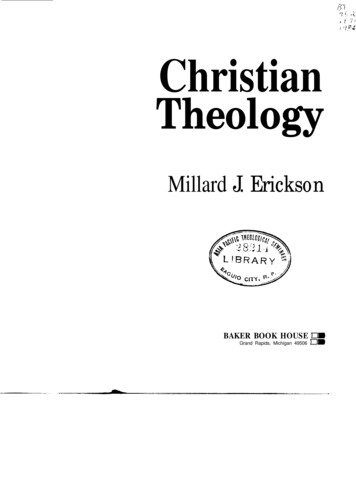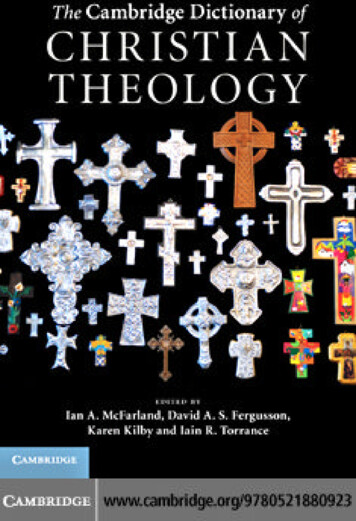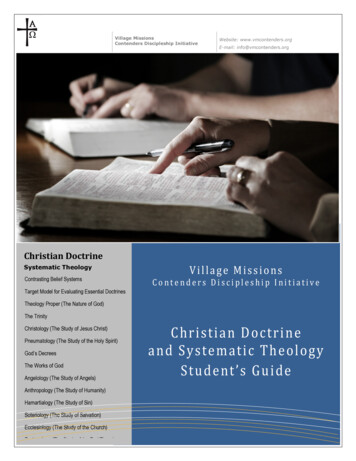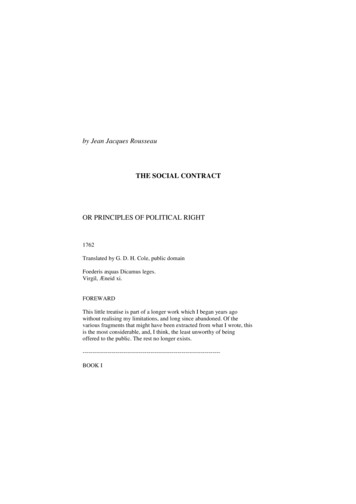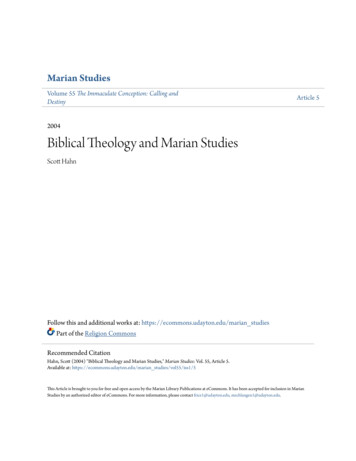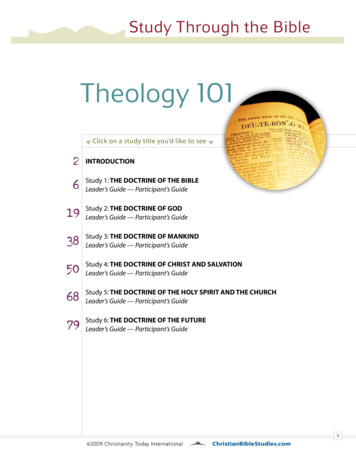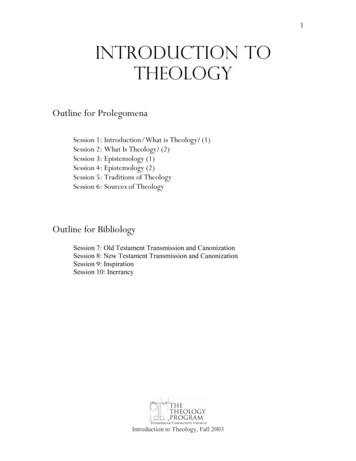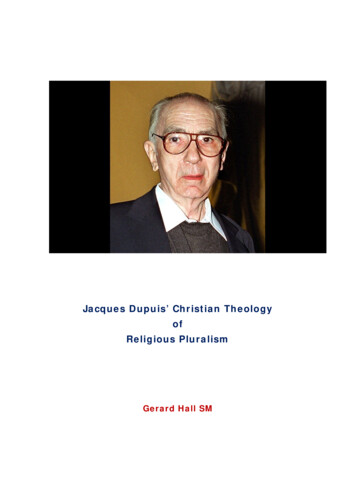
Transcription
Jacques Dupuis’ Christian TheologyofReligious PluralismGerard Hall SM
Abstract: Given the politics and publicity surrounding Jacques Dupuis'Toward a Christian Theology of Religious Pluralism, 1 his contributionto the developing theology of religious pluralism deserves closer scrutiny.The general question guiding this discussion is the following: does JacquesDupuis provide adequate resources for claiming the both the authenticity ofChristian revelation and a genuinely positive acceptance of religiouspluralism? The article outlines Dupuis' interreligious hermeneuticalmethodology, enquires into his understanding of the uniqueness of JesusChrist, and examines the implications of his Trinitarian Christology for atheology of religious pluralism. Dupuis' contribution is then assessed fromthe dual perspectives of Christian theology and theological rhetoric. Finally,the issue of Christian universalism is brought to hermeneutical attention.IntroductionThe issue of Christian identity and religious pluralism is anemerging area of theological debate. The time is not so long pastwhen Christian apologetics simply rejected the ordinary possibility ofsalvation for "pagans and infidels”. 2 For Catholics, the second VaticanCouncil marked a significant change of approach to other religions bydeclaring that they may indeed contain divine "rays of truth”. 3 Nearlyhalf a century later, there has been an explosion of opinions andJacques Dupuis (1923-2004) was a Belgium Jesuit missionary in Indiabefore becoming professor of theology at Rome’s Gregorian University. Hismajor work, Toward a Christian Theology of Religious Pluralism (MaryknollNY: Orbis, 1997), was investigated by the Vatican Congregation for theDoctrine of the Faith (CDF) between June 1998 and January 2001.Although not found to be in doctrinal error, CDF issued a statement inwhich it found his book contained "notable ambiguities and difficulties onimportant doctrinal points which could lead a reader to erroneous orharmful opinions." For an abridged version of the official "notification"(signed by Cardinal Ratzinger, 26th February 2001), see The Tablet (3rdMarch 2001): 325f.1Many theologians, such as Thomas Aquinas, were more cautious. The"implicit desire" for baptism, for example, was sometimes understood infairly universal terms. In the Patristic era, there was an even widerexpression of belief about the contours of salvation, especially in terms ofthe "Cosmic Christ." See TRP, 53-83.2Nostra Aetate, 2. Similar expressions are found in other Vatican IIstatements. See, for example: Lumen Gentium, 16; Gaudium et Spes, 92;Ad Gentes, 9, 11, 15, 18.32Gerard Hall: Jacques Dupuis’ Christian Theology of Religious Pluralism
writings on the subject of religious pluralism not least from aChristian perspective. At this point, it is helpful to note that someapproaches are more sociological or ideological than theological.Jacques Dupuis' own contribution is both theological and, one maysafely say, Catholic. He says at the beginning of his book that heintends "an introduction to a theology of religions, at once historicaland synthetic, genetic and up-to-date”. 4 His concern is to show thata theology of religious pluralism is possible not just in a generalChristian sense, but especially within the heritage and with theresources of the Roman Catholic tradition.Dupuis' Avowed Method and ArgumentIn contrast to traditional theological methods, which weredeductive, dogmatic and genetic – beginning with doctrinal principlesand/or biblical data to arrive at logical applications for today –Dupuis proposes an inductive, contextual and hermeneutic theology. 5He speaks not of the "hermeneutical circle" but the "hermeneuticaltriangle" consisting of the mutual interaction between text, extincludeseverything contained in "Christian memory"; context is both aconcrete place and time in human history and its theoreticalcomplexities; interpreter is less the individual theologian than thecommunity of faith to which the theologian belongs. Dupuis is, then,indebted to the hermeneutical theology of mutual and criticalcorrelation, 6 as well as to the Anselmian insistence that theologyarises from Christian faith.4TRP, 2.5TRP, 13-19.See David Tracy, The Analogical Imagination: Christian Theology in anAge of Pluralism (New York: Crossroad, 1981), and; Claude Geffré, TheRisk of Interpretation: On being Faithful to the Christian Tradition in a NonChristian Age (New York: Paulist, 1987). Both works are included in Dupuis'bibliography and he explicitly acknowledges his indebtedness to thehermeneutical methodology of Geffré in TRP, 15.63Gerard Hall: Jacques Dupuis’ Christian Theology of Religious Pluralism
When it comes to doing a theology of religious pluralism,Dupuis suggests we need a new method which makes its point ofdeparturethepraxisofinterreligiousdialogue. 7Suchan"interreligious hermeneutical theology" will hopefully lead to thediscovery of cosmic dimensions of the mystery of God, Christ and theSpirit "at a new depth." Dupuis finds the praxis methodologies ofliberation theology instructive. Just as liberation theology begins withreflection on the concrete context of injustice and oppression, thetheology of religious pluralism begins with reflection on and withininterfaith dialogue. Moreover, as in liberation theology, this will leadto a critique of aspects of the tradition and the discovery of newunderstanding of God's revelation in the contemporary world.Dupuis speaks of the "remarkable evolution" and "spectacularchanges" in today's world which justify a "paradigm shift" in Christiantheology. This is pertinent in view of the traditional, theologicaltendency to define all religious traditions in universalist terms. Hestates that his goal is not to develop some new "universal theology"which levels out all differences, but to promote "dialogical opennessand mutual enrichment through conversation”. 8 Effectively, Dupuis sedsensitivity to the demands of the religious 'other' to be respected andunderstood "in their very otherness”. 9 This necessarily represents asignificant challenge to traditional Christian understanding of themystery of Christ and the world's religious traditions.7TRP, 18f.TRP, 7. Dupuis is here indebted to the writings of Raimon Panikkar whichhe indirectly acknowledges.8TRP, 7. The importance of "the other qua other" as the issue for religiouspluralism is well described in Raimon Panikkar, "The Myth of Pluralism" inCross Currents 29 (1979) 197-230; and Invisible Harmony (Minneapolis:Fortress Press, 1995) 52-91. Emmanuel Levinas has developed the notionof "being-for-other" as the ethical challenge for postmodernity: theologicalimplications are developed by Terry Veling, “In the Name of Who? Levinasand the Other Side of Theology” in Pacifica 12/3 (October 1999) 275- 292.94Gerard Hall: Jacques Dupuis’ Christian Theology of Religious Pluralism
For all that, Dupuis adopts a rather traditional structure for hiswork described as historical and systematic (Part One) and organicand thematic (Part Two). The historical and systematic theologianwill be most at home in Part One which is a helpful overview of thehistory of doctrines and beliefs that inform the Christian--especiallyCatholic--memory important for any contemporary approach toreligious pluralism. However, the approach is more deductive thaninductive. The paradigm shift towards an inductive theology based onthe praxis of interreligious dialogue only emerges in Part Two. Theattempt is to present an understanding of salvation that is faithful tothe constitutive and unique role of Jesus Christ while also affirming agenuine plurality of religious paths in accordance with the divineplan. Dupuis wishes to achieve this by moving beyond any kind of"fulfillment theology" which affirms the value of other religioustraditions only in a secondary and provisional sense. 10 The rest ofthis article will present and assess Dupuis' proposals.The Constitutive Uniqueness of Jesus ChristUnlike some religious and theological pluralists, Dupuis affirmsunconditionally the uniqueness and universality of Jesus Christ. 11 Heis in no manner disputing either the ontological, divine status ofJesus Christ or the pivotal role of the incarnation in the divineeconomy of salvation. He specifically rejects a purely functional, lowchristology which would equate the role of Jesus Christ in Christianityto the role of other Saviour figures in their particular traditions. SuchSee, for example, Karl Rahner, "Christianity and the Non-ChristianReligions" in Theological Investigations 5 (London: Darton, Longman &Todd, 1966) 115-134. Despite rejecting Rahner's "fulfillment theology,"Dupuis' dependence on Rahner's theological underpinnings is considerable.The "fulfillment theory" is also associated with Jean Danielou, Henri deLubac and Hans Urs van Balthasaar. For a discussion of these approaches,see TRP, 130-157.10Dupuis presents the major aspects of his Christology in chapter eleven,"Jesus Christ--One and Universal" in TRP, 280-304.115Gerard Hall: Jacques Dupuis’ Christian Theology of Religious Pluralism
relativism is dismissed out of hand with reference to the inadequacyof its biblical and christological hermeneutics as well as to aninappropriate reading of the specific roles of other Saviour figureswith respect to their own traditions. We will return to this secondpoint. For the moment, we will concentrate on Dupuis' affirmationthat the traditional Christian claim still stands: "Faith in Jesus Christdoes not merely consist in trusting that he is 'for me' the path tosalvation; it means to believe that the world and humankind findsalvation in and through him”. 12 This, it is argued, is evident in the"massive claims" of the New Testament.Dupuis is fully aware that both the New Testament andsubsequent Greek thought influenced, systematized and, in somesense, ontologized Christ. However, he understands this in terms of"homogenous development" and "inculturation" rather than as asimplistic "process of deification" that has no warrant in the originalkerygma. 13 He stresses that the Church's explicit Christology isgrounded in the implicit Christology of Jesus himself. Moreover,admitting that concepts such as preexistence and incarnation derstanding" does not thereby deny their essential truth-claim:"the man Jesus of Nazareth is the Logos of God in person."Otherwise stated, "the constitutive uniqueness and universality ofJesus Christ" rests on his "personal identity as the Son of God."Nonetheless, the particularity of Jesus of Nazareth as "a mortalman" needs to be taken seriously. 14 It is here that Dupuis hopes tofind an opening for a theology of religious pluralism. The limitationsof every human existence, including that of the historical Jesus, arereal. Neither the mystery of God nor God's saving power can be12TRP, 292f.13TRP, 294-297.TRP, 297-300. Dupuis quotes at length, and with approval, Geffré,Schillebeeckx and Duquoc who likewise stress the historical particularity ofthe Christ-event.146Gerard Hall: Jacques Dupuis’ Christian Theology of Religious Pluralism
exhausted by even such a sublime revelation as the Christ-event.This means that, while Jesus Christ is "the universal sacrament ofGod's saving action," he is not thereby the only expression of thedivine will to save. Making it clear that the mystery of the incarnationis unique in Jesus, there is room for "other saving figures" to beenlightened by the Word and inspired by the Holy Spirit. SpiritChristology are needed. After all, the non-incarnate Logos and theuniversal presence of the Spirit are present both before and after theincarnation. The Christ-event is certainly the "culminating point" ofGod's one economy of salvation; but the God who saves is three.Stated differently, Dupuis tells us that while Jesus Christ is the"universal Saviour," he is not thereby the "Absolute Saviour”. 15Absolute is an attribute of the ultimately Real, namely, God. Nor, ofcourse, should one speak of any historical religion, includingChristianity, in absolute terms. However, what is most at stake hereis the understanding of the relationship between God and Christ and,more particularly, Christ and the Logos. Relying on his TrinitarianChristology, Dupuis states that Jesus-the-Christ and the divine Wordor Logos are inseparable yet distinct. It is the paradox that Nicholasof Cusa referred to as the "concrete universal”. 16 Jesus Christ is theLogos in human flesh and, as such, has universal significance for theworld's salvation; however, the God of Jesus, whose "superabundantgraciousness and absolute freedom" abound, does not exhaust thedivine saving reality in the human action of the anduniversality of Jesus Christ are neither absolute nor relative, butwhathecallsconstitutive15TRP, 282, 292, 303f.16TRP, 299.7andrelational.HedevelopshisGerard Hall: Jacques Dupuis’ Christian Theology of Religious Pluralism
understanding of these categories in relation to the question ofpossible multiple paths of salvation.Implications for a Theology of Religious PluralismHaving asserted that Jesus Christ is the universal sacrament ofsalvation and the culminating point of a single divine economy,Dupuis then addresses the issue of how a Christian theology ofreligions can account for multiple salvific paths. 17 We recall that hewishes to do this without advocating a fulfillment theology ofreligions. Taking his Trinitarian/Spirit Christology as a starting point,he considers in turn: (1) the inclusive presence in history of themystery of Jesus Christ; (2) the universal power of the Logos; and(3) the unbound action of the Spirit. This leads to his conclusion thatthe religions represent complementary values and divergent pathswhich are, nonetheless, authentic human paths to salvation.With reference to the inclusive presence of the mystery ofJesus Christ in human history, Dupuis is not satisfied with anapproach that ignores the actuality of the various religious traditions.He insists that the mystery of Jesus Christ is historically mediated tonon-Christians in and through specific religious beliefs and practicessuch as the Hindu worship of sacred images. It is in "the verypractice of their religion" that God is present to them in a "privilegedinstance" of divine self-communication. 18 In stating this, Dupuis isaffirming the integrity of the religious traditions on their own termsas distinct from their relationship to Christianity. However, this doesnot imply an equality of religions since religious practices andsacramental rites of other traditions "are not on the same footing asthe Christian sacraments instituted by Jesus Christ”. 19 In brief, otherreligions may be authentic paths to salvation, but they remain17TRP, 305-32918TRP, 319 & 303.19TRP, 319.8Gerard Hall: Jacques Dupuis’ Christian Theology of Religious Pluralism
qualitatively distinct from the manner in which Christianity mediatesthe mystery of Christ overtly, explicitly and with full visibility.Directing his attention to the universal power of the Logos andunbound action of the Spirit, Dupuis affirms the divine presence inhistorical persons and movements in the religious traditions. Thisleads him to acknowledge a two-way process of "mutual ample,wisdom,complement Christian emphasis on agapeic involvement in thestruggle for justice. 20 The two ways are complementary and diverse:Buddhism emphasizes the saving value of wisdom; Christianity, thesaving value of love. Each tradition can learn from the other so that,according to Dupuis, complementarity does not imply a fulfillmenttheory. In this instance, Buddhism has its own unique revelation ofthe non-incarnate saving Word that is qualitatively different toChristian experience of the one and same Word. Dupuis is quick toadd that while all manifestations of the Word do not have the samesignificance this does not mean they need to be understood infulfillment terms.Where does this lead? Following Alois Pieris, and in similar veinto Raimon Panikkar, Dupuis posits a distinction-in-identity betweenJesus Christ and the saving Logos. 21 The "mediating reality" yandunequivocally identified with Jesus Christ, Gautama Buddha or anyother historical saving figure. From the Christian perspective, JesusChrist is the unique Saviour, the one in whom salvation isaccomplished (identity), but manifestations of the saving Word arenot unique to Jesus Christ (distinction). Stated differently, it is theTRP, 326-329. Dupuis makes productive use of the Sri Lankan Jesuit,Alois Pieris, whose writings on Buddhist-Christian dialogue are well known.20Dupuis quotes substantially from Alois Pieris, Love Meets Wisdom: AChristian Experience of Buddhism (Maryknoll NY: Orbis, 1988). ForPanikkar, see his Salvation in Christ: Concreteness and Universality: TheSupername (Santa Barbara CA: Private Manuscript, 1972).219Gerard Hall: Jacques Dupuis’ Christian Theology of Religious Pluralism
same Word that enlightens Gautama Buddha and becomes flesh inJesus Christ. This leads Dupuis to speak of "various though not equalpaths" in which the divine, saving presence is mediated in historythrough Word and Spirit. 22 Moreover, as an historical religion,Christianity also stands in an ambiguous relationship to the mysteryof Jesus Christ which surpasses all historical, cultural and religiousexpressions. In this sense, Dupuis alludes to a "convergence betweenthe religious traditions and the mystery of Jesus Christ”. 23What then is the precise relationship between historicalChristianity and other religious traditions? Dupuis speaks of a"regnocentric perspective”. 24 What is important is the "reign of God"of which the Church is the "universal sacrament" but not the onlyhistorical mediation. Other religions "exercise a certain mediation ofthe reign" which are described as "different . . . but no less ions:even"Otherreligious traditions . . . can at the end of time share in the fullness ofthe Kingdom without having to be linked at the last stage to an'eschatological Church'". 26 Consequently, convergence between thereligious traditions does not assume the eradication of religiousdivergence even in the final Kingdom since the eschatological reality22TRP, 328.23TRP, 328.TRP, 330-357. Interestingly, the "regnocentric perspective" hassimilarities to Paul Knitter's "soteriocentric approach" developed in earlierwritings. See Knitter's "Towards a Liberation Theology of Religions" in TheMyth of Christian Uniqueness, eds. J. Hick & P. Knitter (Maryknoll NY:Orbis, 1987) 178-200. Nonetheless, Dupuis opposes what he considers tobe Knitter's minimal stance regarding Christian identity and mission. See,for example, his critique of Knitter's Jesus and the Other Names (MaryknollNY: Orbis, 1996) in TRP, 372f.24TRP, 356. Dupuis uses Rahner's sacramental theory to describe therelationship of identity and non-identity between the historical Church andthe universal reign of God. Other religions are described in terms of'mediation' rather than 'sacrament' of God's reign though the distinctionbetween these two terms is not explicated.2526TRP, 357.10Gerard Hall: Jacques Dupuis’ Christian Theology of Religious Pluralism
is not the heavenly Church but the fullness of God's reign.Meanwhile, dialogue is possible among members of the variousreligious traditions insofar as they are already connected under theuniversal reign of God. 27 Finally, it is communion with the Triune Godthat is the ultimate goal of human beings, a goal achieved in God'sgrace and providence through multiple religious paths.A Theological ResponseFrom a Christian theological perspective, Dupuis is clearlyfaithful to the Christian tradition in stating that all divine revelation isthe communication of the triune God. Other religious traditions mayreceive their unique divine treasures of grace and wisdom but, forthe Christian, these will always be measured against revelation inJesus Christ who is the universal Saviour and culminating point of thesingle economy of salvation. Within this framework of traditionalChristian theology, the novel aspect is the suggestion that otherreligions represent permanently distinct and valid ways of sandtheunbounded action of the Spirit. Consequently, Christianity is not theonly beneficiary of divine revelation. In fact, there may be divineself-communications to other traditions that Christians do not,perhaps cannot, receive. This provides the space for encounteramong religious traditions that is genuinely dialogical and forms thebasis of his Christian theology of religious pluralism.A theological response to Dupuis' proposal needs to question towhat extent he achieves his goal of moving beyond the fulfillmenttheology of Karl Rahner. It is true that Rahner concentrates on howJesus Christ is present and operative in the faith of individual nonChristians. Nonetheless, even Rahner leaves the way open for aland"Dialogue takes place between persons who already belong together tothe reign of God inaugurated in history in Jesus Christ”. TRP, 346.2711Gerard Hall: Jacques Dupuis’ Christian Theology of Religious Pluralism
institutional realities”. 28 Where Dupuis extends Rahner is in theexplicit rejection of an approach that sees Christianity bringing otherreligions to fulfillment in a one-sided process. 29 For Dupuis, theprocess is two-way so that it remains possible that Christianity willonly find its own fulfillment through encounter with other traditions.Although this may seem to be a radical departure from traditionalChristian teaching, its radicality should not be overemphasized.Dupuis maintains that all religious traditions remain oriented to themystery of Jesus Christ who "brings salvation history to a climax”. 30Thus, while avoiding a one-sided fulfillment theology of religions, hestill advocates a universal theology of religions that interprets allreligious faith in Christian categories. 31In a language reminiscent of Rahner, Dupuis understands thatthe mystery of salvation is mediated overtly, explicitly and with fullvisibility through Christianity. In other traditions, the mediation isimplicit, concealed and incomplete. 32 Such subordinationist languagemay acknowledge that other religions contain elements of divinewisdom and moments of divine grace, but these still only "anticipateGod's fuller disclosure and decisive self-gift in Jesus Christ”.33Evidently, this represents a fulfillment-type theology in whichChristians alone see the work of salvation accomplished in theconcrete figure of the crucified Christ. 34 At the very least, Christianshave an epistemological superiority despite the integrity of thereligious experience of divine grace in other traditions. This impliesK. Rahner, Foundations of Christian Faith (New York: Seabury, 1978)315f.2829TRP, 326.Dupuis affirms Teilhard de Chardin's "eschatological sense" of the"convergence of religions in the universal Christ”. TRP, 388-390.30Although Dupuis distinguishes between a "theology of religions" and a"theology of religious pluralism" (see TRP, 12f.), his aim is still to establisha universal theology from the perspective of Christian particularity.3132TRP, 319.33TRP, 325. Emphasis added.34TRP, 328.12Gerard Hall: Jacques Dupuis’ Christian Theology of Religious Pluralism
that other religious paths to salvation are valid and genuine but, ashe states unequivocally, they are not equal. Christianity can certainlylearn from them through the experience of interreligious dialogue,but the relationship between the divine saving Logos and Christianityremains especially puis'understanding of the relationship between Christ, the Logos and theChurch that traditional Christian theology will want to question. Byemphasizing the non-identity between Jesus Christ and the savingLogos, Dupuis will be accused, in his own words, of threatening "theindissoluble link between the Christ of faith and the Jesus ofhistory”. 35 By minimizing the saving role of the Church, 36 he will beaccused of reducing the significance of his "constitutive Christ" to thehistorical Jesus with all but a tenuous connection to the postresurrection, post-Pentecost community of Jesus' explicit and visiblefollowers. 37 There is paradox here insofar as Dupuis emphasizes theimportance of the socio-historical mediation of grace in otherreligions while appearing to minimize its import for Christianity.The importance of these critiques from both religious pluralistsand Christian theologians is that they highlight the difficulty, if notimpossibility, of arriving at a theology of religious pluralism based onthe "universal" role of a particular Saviour figure however narrowlyor broadly interpreted. Perhaps the best we can hope for are diversetheologies of religious pluralism on the basis of different and finallyThis is Dupuis' earlier assessment of Panikkar's Christology. See Dupuis,Jesus Christ at the Encounter of World Religions (Maryknoll NY: Orbis,1991) 183-190 esp. 187.35In his desire to overturn a rigid interpretation extra ecclesiam nulla salus,Dupuis constantly advocates that non-Christians may attain salvation"without belonging in whatever way to the Church”. TRP, 349.36This critique is developed by Gavin D'Costa, "Toward a Christian Theologyof Religious Pluralism" in Journal of Theological Studies 49:2 (1988) 910914.3713Gerard Hall: Jacques Dupuis’ Christian Theology of Religious Pluralism
incomparable religious experiences. 38 Dupuis' own theology has alconservatism”. 39 Others may claim that his praxis of interreligiousdialogue is too limited or that his doctrinal modifications are elf-understanding in a pluralistic religious world is significant, not leastfrom a rhetorical perspective.A Rhetorical ResponseFor this reason, Dupuis' work is better read as a theologicalrhetoric rather than formal theological doctrine. As David Klemmstates, whatever else theology is, it is "eminently rhetorical--and inneed of a new rhetoric”. 40 Unlike doctrine, which focuses on theintellectual formulation of belief, rhetoric focuses on the images,metaphors and partial logics associated with the communication ofnew ideas and values. 41 This is to affirm the place of humanexperience and intuition in the search for truth. Accordingly, rhetoricis also described as "discourse on the margins of thought andaction”. 42 In fact, Dupuis sometimes finds himself on the margins oftraditional Christian rhetoric only because such rhetoric largelybelongs to an era in Christian life that espoused a language and selfRaimon Panikkar has long maintained that religious traditions shareincommensurable, mutually exclusive, respectively contradictory and finallyunbridgeable values that no theory of religious pluralism can ultimatelyexplain. For Panikkar, religious pluralism needs to be appropriated at thelevel of the mythos rather than the logos. See, for example, "The Myth ofPluralism" and Invisible Harmony.38See George Lindbeck's review of TRP in International Bulletin ofMissionary Research (January 1998) 34.39D. Klemm, "Toward a Rhetoric of Postmodern Theology" in Journal of theAmerican Academy of Religion 55:3 (1987) 444.40Stephen Happel, "Religious Rhetoric and the Language of TheologicalFoundations" in T. Fallan & P. Riley (eds.), Religion and Culture (Albany:Suny Press, 1987) 194ff41Robert Hariman, "Status, Marginality, and Rhetorical Theory" in QuarterlyJournal of Speech 72 (1986) 51.4214Gerard Hall: Jacques Dupuis’ Christian Theology of Religious Pluralism
understanding in opposition to other traditions. Religious experiencetoday is increasingly concerned with the space of mutuality in whichChristian, Buddhist, Hindu and other are able to validate a broaderreligious experience than that of any single tradition.Scholars of rhetoric identify four master tropes of discourse:metaphor, metonymy, synecdoche and irony. 43 Where such tropesare used effectively in theological communication, they provide a"deeper grammar" which mediates concepts and doctrines withintuitive religious experience. Certainly, rhetorical devices cannot inthemselves settle doctrinal truth-claims, but they may indicate thelimitations of a worldview and language in which those truth-claimswere formulated. They may also point to new possibilities fortheological discourse which arises from the Christian tradition whilealso being responsive to the emerging experience of religiouspluralism and interreligious dialogue. As will now be shown, Dupuismakes productive use of the four major tropes which can aid ourinterpretation of his work as a postmodern theological discourse.Dupuis' primary metaphor is his Trinitarian Christology throughwhich he affirms the pluralism of divine self-communication in Wordand Spirit. This accords with the emerging postmodern metaphor ofotherness which seeks "to uncover what is questionable and what isgenuine in self and other, while opening self to other and allowingother to remain other”. 44 Postmodern theological rhetoric needs totake religious pluralism seriously without denying the authenticity ofeither one's own or the other's religious experience. This is asignificant challenge for Christianity and the other monotheistictraditions. Trinitarian christology as a metaphor for divine selfSee Haydon White, Tropics
Christ, and examines the implications of his Trinitarian Christology for a theology of religious pluralism. Dupuis' contribution is then assessed from the dual perspectives of Christian theology and theological rhetoric. Fin
